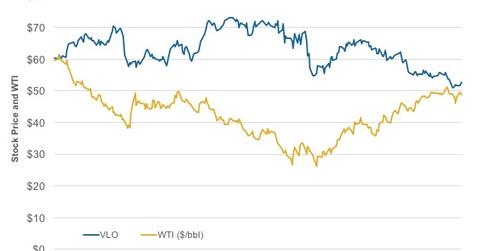What’s the Correlation between Valero Stock and Oil Prices?
The correlation value for Valero stock and the price of oil shows they have a positive but feeble correlation. Valero stock moves in line with WTI prices only to a certain extent.
July 8 2016, Updated 5:04 p.m. ET

What is correlation coefficient?
So far in this series, we’ve looked at Valero Energy’s (VLO) stock movements, refining margin, cracks, spreads, margin indicators, leverage, cash flows, and valuations. In this part, we’ll examine the correlation between Valero stock and oil prices.
Correlation coefficient shows the relationship between two variables. A correlation coefficient value of 0–1 shows a positive correlation. Zero means no correlation, and -1–0 shows an inverse correlation. We’ve considered here a 12-month price history of VLO and WTI (West Texas Intermediate) crude oil.
Valero stock and oil prices
The correlation coefficient of Valero (VLO) and WTI stands at 0.18. The correlation value for Valero stock and the price of oil shows they have a positive but feeble correlation. Valero stock moves in line with WTI prices only to a certain extent. This means that around 18% of the movement in Valero’s stock price can be explained by changes in the price of oil.
Valero’s peer correlation analysis
The situation remains the same for VLO’s peer Tesoro (TSO). The correlation of TSO and WTI stands at 0.21. Other downstream players such as Western Refining (WNR), Delek US Holdings (DK), Alon USA Energy (ALJ), and Phillips 66 (PSX) show slightly higher correlations to WTI of 0.30, 0.32, 0.34, and 0.46, respectively.
As we analyze an integrated energy company, it’s worth noting that the correlation to the price of oil is higher than a downstream company. A case in point is Statoil (STO), an integrated energy giant, that has a 0.73 correlation with WTI. This is because integrated energy companies have upstream operations as well as downstream activities.
An upstream segment’s earnings are directly impacted by the price of crude oil. In fact, in a higher oil price scenario, upstream earnings make up a major part of integrated energy companies’ earnings.
If you’re looking for exposure to refining sector stocks, you can consider the iShares North American Natural Resources (IGE). The fund has ~6% exposure to refining and marketing sector stocks.
